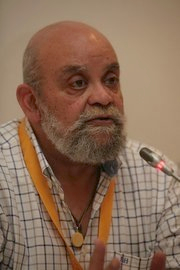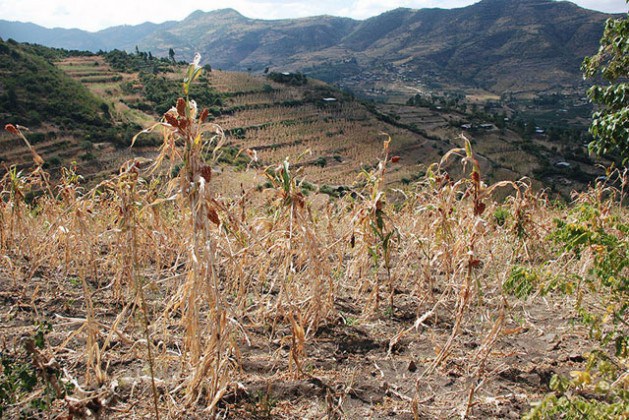By Baher Kamal*
ROME, 18 July, 2016 (IPS) – As if human-made armed conflicts, wickedness, rights abuse, gender violence, cruel inequality and climate catastrophes were not enough, now the saying “God Always Forgives, Men Sometimes, Nature Never” appear to be more true than ever. See what happens.
Now that the 2015-2016 El Niño –one of the strongest on record– has subsided, La Niña – El Niño’s ‘counterpart’– could strike soon, further exacerbating a severe humanitarian crisis that is affecting millions of people in the most vulnerable communities in tens of countries worldwide, especially in Africa and Asia Pacific.
El Niño is the term used to describe the warming of the central to eastern tropical Pacific that occurs, on average, every three to seven years. It raises sea surface temperatures and impacts weather systems around the globe so that some places receive more rain while others receive none at all, often in a reversal of their usual weather pattern.
La Niña is the opposite weather phenomena—it lowers sea surface temperature producing a counter impact and anyway bringing more catastrophes with heavy rains in areas affected by El Niño draughts and more of these in flooded regions.
Devastation
While El Niño has devastated harvests, livestock and thus livelihoods, its huge impact on children is worsening, “as hunger, malnutrition and disease continue to increase following the severe droughts and floods spawned by the event,” a new report from the UN Children’s Fund (UNICEF) has just revealed.
Making matters worse, there is a strong chance La Niña could strike at some stage this year, UNICEF’s report “It’s not over – El Niño’s impact on children” alerts.

El Niño, and its counterpart La Niña, occur cyclically, in recent years, mainly due to the effects of global climate change, extreme weather events associated with these phenomena –such as droughts and floods– have increased in frequency and severity.
“Millions of children and their communities need support in order to survive. They need help to prepare for the eventuality La Niña will exacerbate the humanitarian crisis. And they need help to step up disaster risk reduction and adaptation to climate change, which is causing more intense and more frequent extreme weather events,” said UNICEF’s Director of Emergency Programs, Afshan Khan.
Millions of Children in Dire Need
Indeed, the UN Children Fund reports that children in the worst affected areas are going hungry. In Eastern and Southern Africa –the worst hit regions– some 26.5 million children need support, including more than one million who need treatment for severe acute malnutrition. “
The same children who are affected by El Niño and threatened by La Niña, find themselves on the front-lines of climate change,” added Khan.
Children in the worst affected areas are going hungry now, UNICEF report says, and warns that their futures are at risk, as extreme weather has disrupted schooling, increased disease and malnutrition, and robbed families of their livelihoods. In drought-affected areas, some children are staying away from class to fetch water over long distances, or have moved away with their families following loss of crops or livestock.
Child Abuse, Exploitation…
Moreover, being out of school often increases a child’s risk of abuse, exploitation and, in some areas, child marriage, UNICEF adds, while warning that malnutrition among children under five has increased alarmingly in many of the affected areas, as families who were already living hand-to-mouth.
In many countries, El Niño affects access to safe water, and has been linked to increases in diseases such as dengue fever, diarrhoea and cholera, which are “major killers of children.”
Drought can also force adolescent girls and women to engage in transactional sex to survive. And mortality for children living with HIV is two to six times higher for those who are severely malnourished than for those who are not, UNICEF reports.
Global Development at Risk
UNICEF is not the sole UN agency to warn against the devastating effects of El Niño and the huge threats from La Niña.

In fact, failure to prepare for and adapt to the ‘new normal’ of increasing climate-linked emergencies such as El Niño could put global development targets at risk and deepen widespread human suffering in areas already hard hit by floods and droughts, top United Nations officials alerted.
The heads of the three Rome-based UN agencies, FAO, IFAD and WFP, along with the UN Special Envoy on El Niño & Climate, warned in a recent meeting that more than 60 million people worldwide, about 40 million in East and Southern Africa alone, are projected to be food insecure due to the impact of the El Niño climate event.
To coordinate responses to these challenges UN agencies and partners on July 6 met at the Rome headquarters of the UN Food and Agriculture Organisation (FAO). The joint meeting included the International Fund for Agricultural Development (IFAD) and the World Food Programme (WFP).
La Niña on the Doorsteps
FAO Director-General José Graziano da Silva warned that the impact of El Niño on agricultural livelihoods has been enormous and with La Niña on the doorsteps the situation could worsen.
“El Niño has caused primarily a food and agricultural crisis,” he said, announcing that FAO will therefore mobilise additional new funding to “enable it to focus on anticipatory early action in particular, for agriculture, food and nutrition, to mitigate the impacts of anticipated events and to strengthen emergency response capabilities through targeted preparedness investments.”
Meanwhile, OXFAM international–a confederation of non-governmental organisations, reported that about 60 million people across Southern Africa and the Horn of Africa, Central America, and the Pacific now face worsening hunger and poverty due to droughts and crop failures in 2014/5 that have been exacerbated by the El Niño weather system in 2015/6.
“This number is likely to rise,” warns this international confederation of NGOs working together for “a just world without poverty, where people are valued and treated equally, enjoy their rights as full citizens, and can influence decisions affecting their lives.”
“What Will Become of Us”
OXFAM has recently issued a short report giving a voice to some of the people that it is working with in Ethiopia, Malawi, Zimbabwe, El Salvador and Papua New Guinea. “They’ve told us that they have lived through bad times before, but that this drought is much worse than previous ones,” says the report, which is authored Debbie Hillier.
These are some of the most impacting excerpts of OXFAM’s report, titled ”What Will Become of Us:Voices from around the world on drought and El Nino.”
“… People go to bed with empty stomachs; toil in their fields or go to school with the gnawing pain of hunger; they walk or cycle for miles to try to find food. Many people have reduced the number of meals they eat per day to two or even one.
… Hunger hurts. For parents, the struggle to put food on the table has been acutely painful; children cry for food, babies nurse on empty breasts.
… Many people have nothing left. Farmers and herders have worked hard, but now they watch their crops fail and their animals die.
… Despite their best efforts, many communities and governments are being overwhelmed.
People cope by draining their savings and stocks, selling assets, borrowing money, and migrating to find work.
… When these are exhausted, coping strategies become more damaging and women and girls often bear the brunt: dropping out of school, entering early and forced marriages, facing an increased risk of violence during longer trips to collect wood, food or water, and transactional sex.”
In its GROW blog channel, OXFAM has also published a short report on El Niño and Climate Change: All You Need to Know, showing the relation between the two weather events.
*Baher Kamal’s report was published in IPS. Go to Original.
 *Baher Kamal, Egyptian-born, Spanish-national secular journalist. He is founder and publisher of Human Wrongs Watch.Kamal is a pro-peace, non-violence, human rights, coexistence defender, with more than 45 years of professional experience.
*Baher Kamal, Egyptian-born, Spanish-national secular journalist. He is founder and publisher of Human Wrongs Watch.Kamal is a pro-peace, non-violence, human rights, coexistence defender, with more than 45 years of professional experience.Baher Kamal is also Senior Advisor to the Director General of international news agency IPS on Africa and the Middle East.
More articles by Baher Kamal in Human Wrongs Watch:
‘Modern World Is Chaotic, Confused; Human Security a Must’
Xenophobic Rhetoric, Now Socially and Politically ‘Acceptable’ ?
‘Hate Is Mainstreamed, Walls Are Back, Suspicion Kills’
What If Turkey Drops Its “Human Bomb” on Europe?
Humanitarian Aid – Business As Unusual?
World Oceans Day – A Death Sea Called Mediterranean
The Humanitarian Clock Is Ticking, The Powerful Feign Deafness
Humanitarian Summit, The Big Fiasco
Humanitarian Summit: Too Big to Fail?
Humanitarian Summit Aims to Mobilise Up to 30 Billion Dollars
Africa, Resolved to Address African Problems With African Solutions
‘We Cannot Keep Jumping from Crisis to Crisis’
‘Human Suffering Has Reached Staggering Levels’
Now 1 in 2 World’s Refugees Live in Urban Areas
Middle East – The Mother of All Humanitarian Crises
Mideast: 1 in 3 Pays Bribe to Access Basic Public Services
Climate: Africa’s Human Existence at Severe Risk
No Water in the Kingdom of the Two Seas – Nor Elsewhere
Will the Middle East Become ‘Uninhabitable’?
Can an Animal Heist Fable Help Solve the Middle East Crisis?
A “Colombian Triangle” for Daesh in Libya?
‘Take My Iraqis and Give Me Some Syrians’ – Europe to Turkey
New Nuclear Hysteria in the Middle East
Africa Launches Largest Trading Block with 620 Million Consumers
Big War Lords Playing Brinkmanship Game in Syria
Cameron at large: Want Not to Become a Terrorist? Speak Fluent English!
Women’s Rights First – African Summit
Africa, Only If It Bleeds It Leads?
Seven Top Challenges Facing African Women
Once Auctioned, What to Do with the ‘Stock’ of Syrian Refugees?
Silence, Please! A New Middle East Is in the Making
The Over-Written, Under-Reported Middle East (II): 99.5 Years of (Imposed) Solitude
The Over-Written, Under-Reported Middle East (I): Of Arabs and Muslims
Egypt in the Rear Mirror (I): The Irresistible Temptation to Analyse What One Ignores
Egypt in the Rear Mirror (II): Who Are the Not-So-Invisible Powers Behind the Troglodytes?
Fed Up With Empty Promises, The Arabs May Abandon Nuclear Non-Proliferation Treaty
Anti-Nukes Move from Norway to Bahrain
Middle East Nuclear Free Bid Moves to Finland – Yet Another Lost Chance?
Annual Spending on Nuclear Weapons, Equivalent To UN Budget For 45 Years
Watch The Sky–It May Rain Atomic Bombs
Save The Planet? Just Eat Cars, Drink Fuel!
Who Is Afraid of 300 Or 400 Or 500 Million Miserables?
Violence And Death For Millions Of Life-Givers
Whither Egypt (I) – Did You Say Dictatorship?
Whither Egypt (II) – Economic Bankruptcy
Politicians Promote Fossil Fuels with Half a Trillion Dollars a Year
Who Dares to Challenge a 32 Billion Dollars Business – Human Trafficking?
Palestine: Yet Another One Hundred Years of Solitude
Does Anyone Know Anything About A New Country Called South Sudan?
South Sudan: Yet Another Kitchen-Garden?
Somalia? Which Somalia? Some Facts About Everybody’s — Nobody’s Land
2016 Human Wrongs Watch










